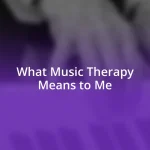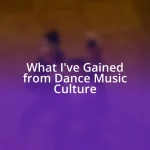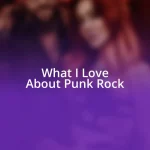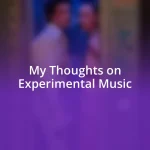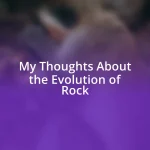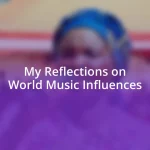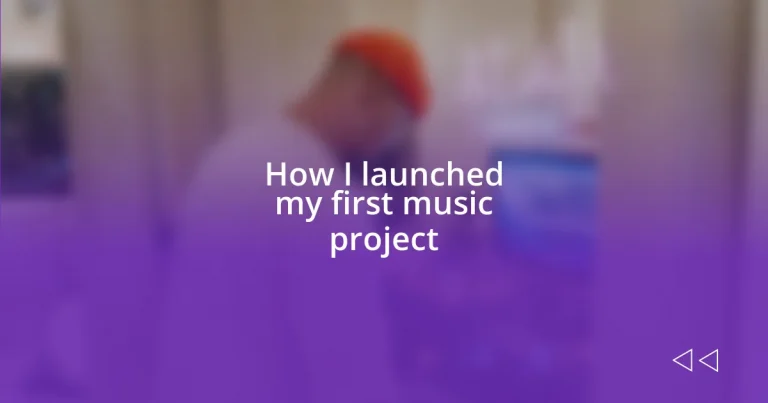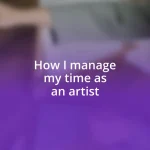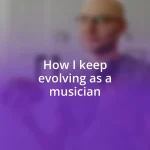Key takeaways:
- Choosing the right music genre is essential; it should reflect your authentic self and experiences to create meaningful music.
- Developing a unique sound involves experimentation with instruments, analyzing influences, and seeking feedback to refine your style.
- Engaging with your audience post-launch through genuine interactions and regular updates fosters a strong connection and community around your music.
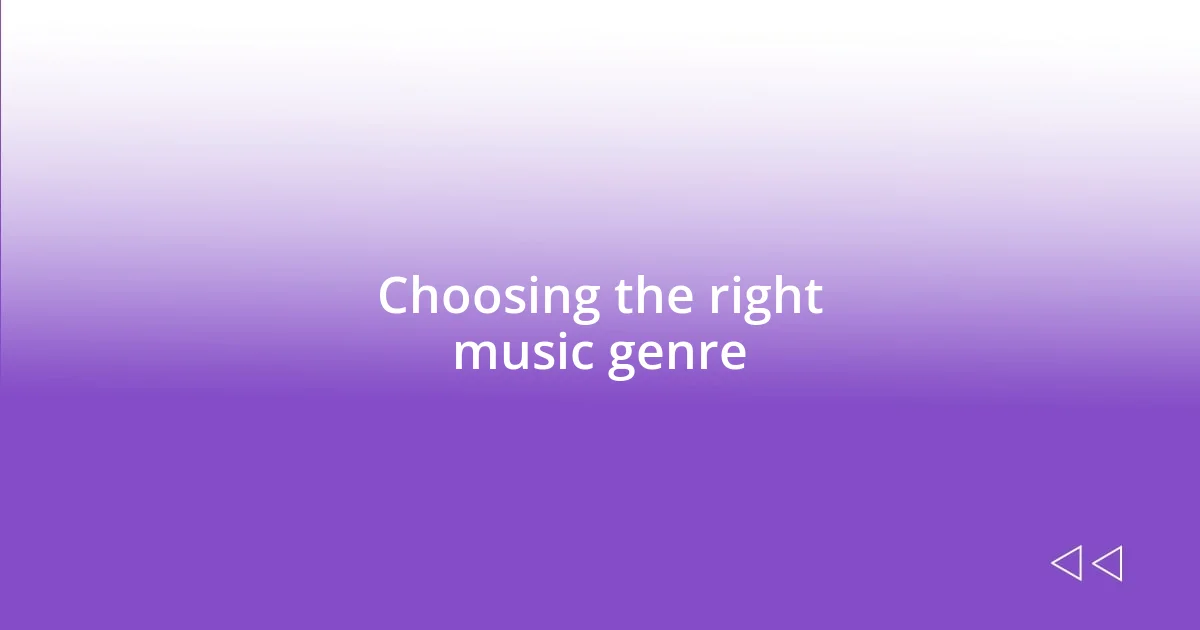
Choosing the right music genre
Choosing the right music genre is a pivotal step in launching your first project. I remember grappling with this decision myself, feeling torn between my love for upbeat pop and the deep, emotional pull of indie music. Have you ever experienced that tug-of-war in your heart when trying to decide what truly resonates with you?
It’s important to consider not just what you enjoy, but also what reflects your experiences and values. For me, writing in a genre that felt authentic allowed me to pour my emotions into my music. A friend of mine once shared that he chose country because it reminded him of family gatherings and storytelling, which deeply connected with his roots.
I’ve learned that identifying a genre can also shape your artistic journey. If you lean into something that reflects your authentic self, the passion in your music becomes palpable. What stories do you want to tell? I found that answering that question for myself revealed not only the genre but also the soul of my project.
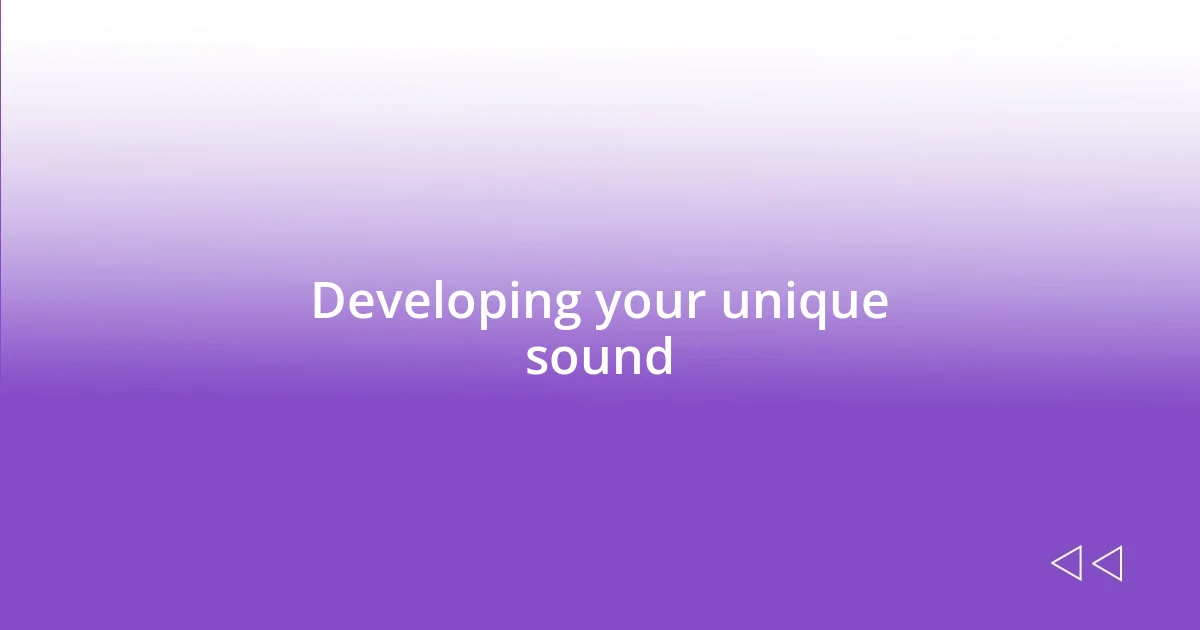
Developing your unique sound
Finding my unique sound was a journey that took time, experimentation, and a whole lot of listening. I remember sitting in my room, surrounded by a mix of vinyl records and digital playlists,trying to pinpoint what truly resonated with me. It was during this exploration that I discovered I loved blending electronic beats with acoustic elements. That fusion not only felt right but also made my music stand out.
To develop your unique sound, consider these steps:
– Experiment with instruments: Trying out different instruments can lead you to unexpected melodies. I picked up a ukulele, which surprisingly influenced my songwriting.
– Analyze your influences: What artists inspire you? Break down their sound and see what resonates with your personal style.
– Create sound palettes: Layering different sounds helps define your signature style. My favorite sound palette included dreamy synths mixed with rhythmic guitar riffs.
– Record and listen: Record your sessions, then step back and listen critically to your work. I often found gems in the bits of music I initially dismissed.
– Seek feedback: Sharing my drafts with trusted friends provided invaluable perspectives and pushed me to refine my sound.
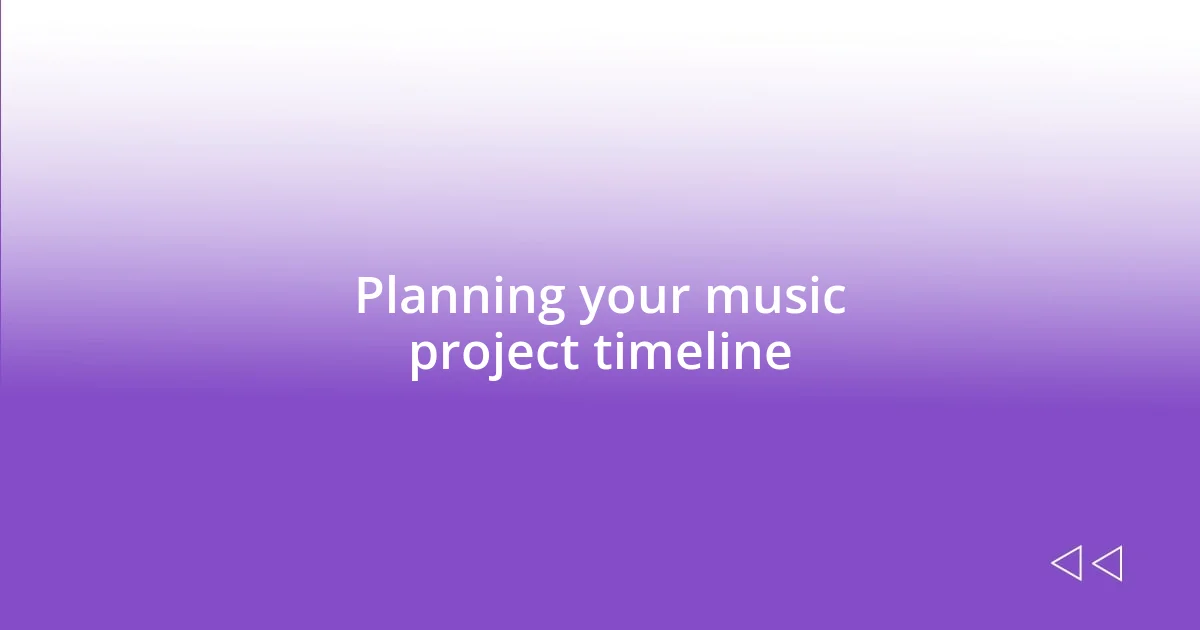
Planning your music project timeline
Planning a music project timeline is crucial for transforming your vision into reality. When I first embarked on my journey, I found that mapping out a clear timeline helped me stay organized and focused. I created a basic structure, breaking down each phase—writing, recording, and promoting—into manageable milestones. This not only reduced my overwhelm but also gave me a sense of accomplishment as I ticked off completed tasks.
One strategy I found particularly effective was setting deadlines for each stage. Initially, I wrote my songs without pressure, but once I established a timeline, I noticed a shift in my creativity. It urged me to push through moments of doubt and sparked a wonderful urgency in my process. For example, I set aside a whole month to finish the writing phase, which allowed me to explore ideas without dragging it out endlessly. This approach also meant I could celebrate small wins along the way, which kept my motivation high.
I’ll share something that might resonate: life can be chaotic, and if you’re anything like me, unexpected events can easily derail your efforts. I remember when I got sidetracked by a family emergency; my timeline took a hit. However, I learned to be flexible with my plans. Adjusting the timeline instead of abandoning it completely allowed me to regain focus quickly. Embracing this adaptability made my project timeline a living tool rather than a rigid schedule.
| Timeline Stage | Description |
|---|---|
| Writing | Set a deadline for crafting lyrics and melodies |
| Recording | Allocate time for tracking instruments and vocals |
| Mixing | Schedule sessions to balance sound elements |
| Promotion | Plan your marketing strategies and outreach efforts |
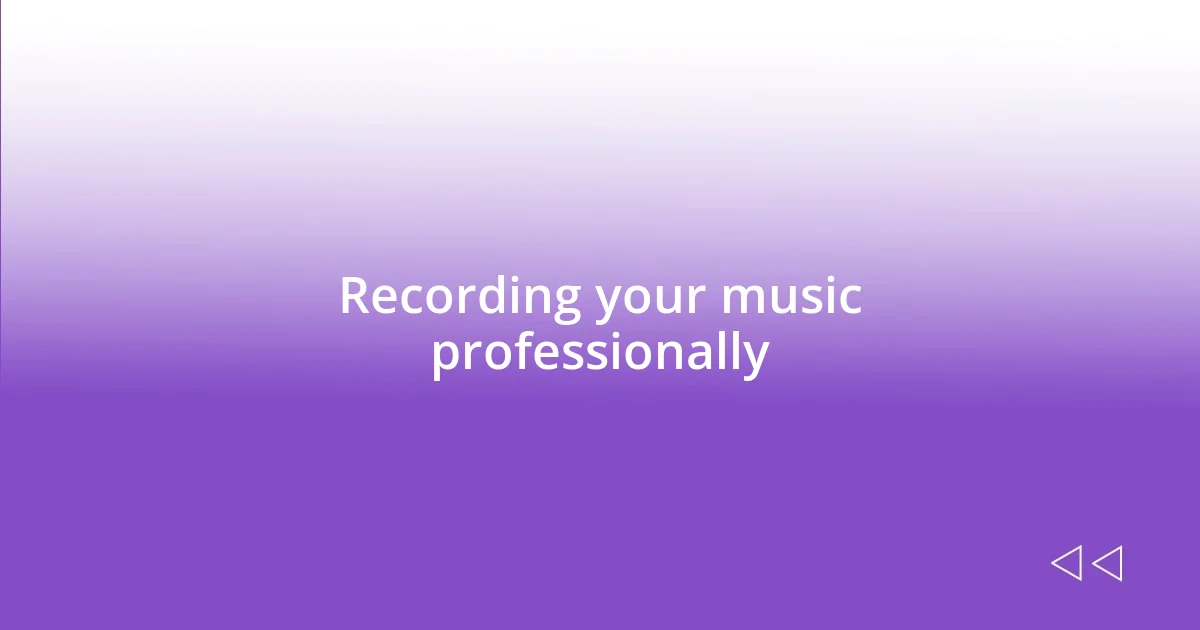
Recording your music professionally
Recording your music professionally is an exhilarating step in the creative process. I remember the first time I stepped into a professional studio; the energy in the room was palpable. It’s amazing how a well-equipped space can elevate your sound. The microphones, mixing consoles, and soundproofing all play a vital role in capturing your music with the clarity it deserves. What equipment is essential? I learned that investing in a quality microphone can make a world of difference in how your vocals are perceived.
One of the biggest revelations I had while recording was the importance of pre-production. Before I entered the studio, I spent weeks rehearsing and refining my arrangements. It’s tempting to think that everything will come together on the fly, but trust me, having a clear plan can save you both time and money. I felt a mix of excitement and nerves as I recorded my first track, knowing I was prepared gave me the confidence to experiment and try different vocal takes. Those moments of exploration often resulted in the best creative outcomes.
When the recording sessions were underway, I found collaborating with a skilled engineer to be invaluable. Their fresh perspective often led to suggestions I hadn’t even considered, and I appreciated their guidance in navigating the technical aspects. I remember one instance where they proposed a unique layering technique that transformed an ordinary chorus into something truly magical. It made me realize that sometimes, stepping back and allowing someone else to inform your process can lead to unexpected layers in your music. What will be that spark for your project?
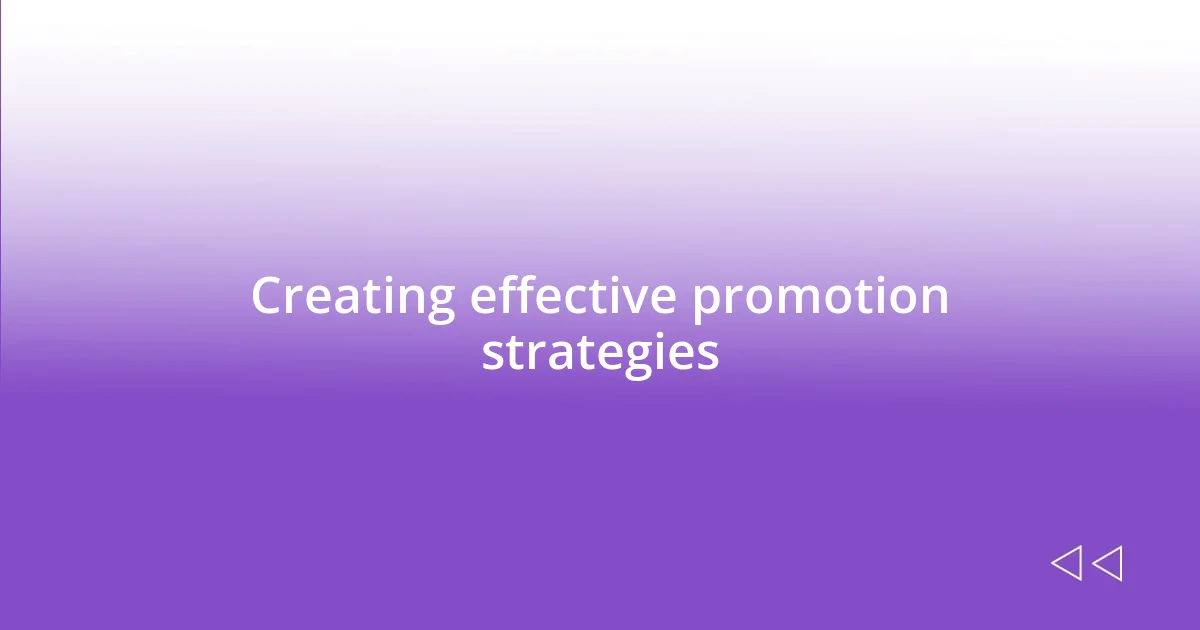
Creating effective promotion strategies
Creating an effective promotion strategy is essential to ensure your music reaches the right audience. I remember when I first released my single; the excitement was palpable, but I quickly realized that sharing it on social media alone wouldn’t suffice. I delved into researching platforms like Instagram and TikTok to engage with potential listeners. By crafting tailored content that resonated with each platform’s audience, I built a buzz that complemented the music itself.
Another approach I found beneficial was collaborating with other artists and influencers. I reached out to creators who aligned with my style and offered mutual support. I vividly recall a duet opportunity that not only expanded my reach but also deepened my creative network. Have you thought about how collaboration could amplify your message? You’d be surprised at how sharing each other’s work can introduce you to a whole new set of fans who may never have discovered you otherwise.
Moreover, I made it a priority to utilize email marketing. While it may seem old-fashioned in the age of social media, I discovered that having a dedicated list of fans who genuinely wanted updates was a game-changer. I crafted engaging newsletters to share behind-the-scenes stories, sneak peeks of upcoming tracks, and exclusive content. The response was overwhelming; my followers appreciated the glimpse into my journey, and in return, they became my most passionate advocates. How could you create a similar connection with your audience? I believe that authenticity in your communication fosters loyalty that surpasses any paid advertisement.
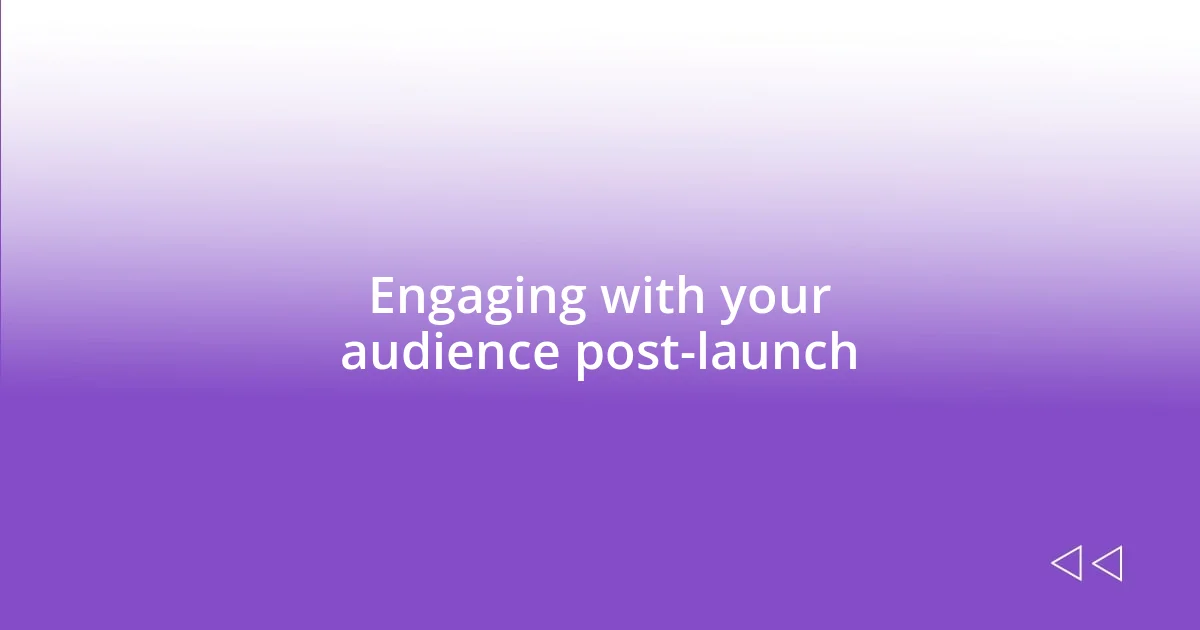
Engaging with your audience post-launch
Once your music is out in the world, keeping the momentum alive requires genuine engagement with your audience. I recall the thrill of reading comments on my first release—I felt connected to my listeners in a way I hadn’t anticipated. It was crucial for me to respond to those messages, thanking fans for their support and sharing a bit about my creative process. I’ve found that expressing gratitude for support not only strengthens my relationship with fans but also encourages them to participate more actively in my musical journey. Have you ever felt that rush when someone shows appreciation for your work?
In addition to responding to comments, I also started hosting live Q&A sessions on social media. During one session, a fan asked me about the inspiration behind my lyrics, something I had never really discussed publicly. It turned into a beautiful conversation that made me realize how much my audience wanted to know me as an artist, not just as a voice in their playlist. That connection transformed the way I approached my music, reminding me that every song I create has its own backstory that listeners are eager to hear. How might sharing these insights change the way your audience perceives you?
Regularly sharing updates and exclusive content keeps the dialogue going. I made it a point to post behind-the-scenes videos of my songwriting process, allowing listeners a peek into my world. I find that when I share those moments, fans feel more invested and often share their thoughts on what resonates with them. That input helps me grow as an artist while reinforcing the bond with my audience. What strategies can you implement to create that ongoing conversation? Engaging consistently with those who support you can transform them from passive listeners into an enthusiastic community.


